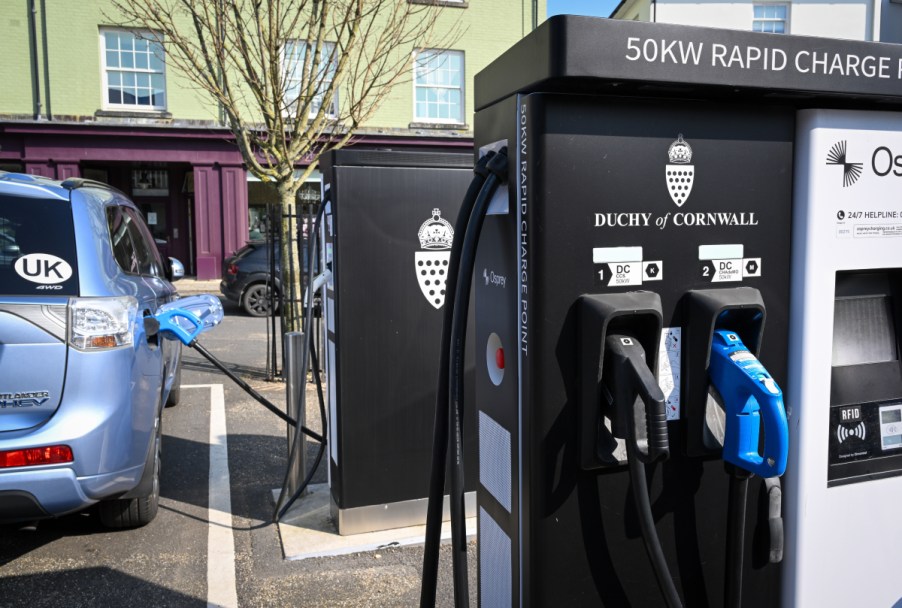
Electric Vehicle Basics: A Guide to EV Range, Charging, and Top Picks
Leaving the world of gasoline-powered cars behind can be a little intimidating. However, learning the basics of electric vehicles like the different kinds of EV charging stations, electric car ranges, and even top picks for family EVs.
How much range does your electric vehicle need?

How much range you need is one of the more critical questions to consider before purchasing an electric vehicle, Cars.com says. The amount of range you need depends on a few factors. Do you have a daily commute to work or school? If so, how long is that trip? Most daily commutes aren’t more than 30-40 miles every day, which means you need at least 50 miles of range to be safe. Most electric vehicles for 2022 have a range of around 250 miles on a full charge.
Do you have an EV charger at work or home? Most people opt to install a home charger to be able to charge overnight. That means you don’t necessarily need a charger at work. Those who might live in an apartment or a more urban area might not have the ability to charge at home. Access to a charger at work or a public area is essential to keep your electric vehicle charging.
You want to ensure you have enough range to get around, though. Automakers suggest keeping your EV charged between 10% SoC (State of Charge) and 80% SoC to keep the battery in good shape.
The basics of electric vehicle charging: home charging vs. DC Fast-Charging
A major hurdle for electric car buyers is the charging situation. As mentioned before, a home charger is a good idea for those with the appropriate place. Most people will need an electrician to install the charger. Home chargers benefit from an accompanying app to help streamline the charging process. As the price of electricity varies, the home charger allows you to charge when the price is the lowest, often in the middle of the night. When you wake up in the morning, the vehicle should be charged and ready to go. This charging only takes a few hours.
Beyond that, EVs come with a charging cable that drivers can use with a regular outlet. This is the slowest type of charging and can take 14-16 hours to charge the electric car fully.
A public charging station usually offers Level 2 electric vehicle chargers. Such stations offer slower charging so people can get out and enjoy the area while charging. When you come back from your dinner, movie, shopping, or whatever it might be, the chargers will have added some range. This can take three to four hours, depending on a few factors.
In contrast, a DC Fast Charging station is meant to get you in and out. With 20 to 30 minutes plugged in, most EVs will be able to charge up to 80%. Tesla Superchargers offer the same length of charging and are usually located in major cities or off major highways.
Top EV picks from Cars.com for 2022 include the Hyundai Ioniq 5
There are enough electric vehicles available to suit everyone’s needs when it comes down to it. One of the best picks for families is the 2022 Hyundai Ioniq 5 electric SUV. Though it looks like a regular SUV, the Ioniq 5 has a lot of room, thanks to the battery pack. It has plenty of room in both the cargo area and the cabin. Plus, the Limited trim has 120-volt outlets in the backseat to power whatever electronics you might need to plug in.
The 2022 Volkswagen ID.4 has a lot to offer buyers. It isn’t the cheapest electric vehicle on the market, but for $41,955, it comes with a lot of positives. The ID.4 has room for five and a lot of space behind the back seat. The ride is comfortable, and the rear-wheel-drive range sits at 280 miles on a full charge. The all-wheel drive version has a 251-mile range and a price of $45,635. All of the Volkswagen ID.4 EVs get three years of unlimited DC Fast-Charging at Electrify America.
The 2022 Chevrolet Bolt EV and Bolt EUV might be a good option for those with a long commute. The Bolt is considered to be a pretty fun electric car to drive and has an EPA-estimated range of 259 miles. It comes with Chevy Safety Assist safety features and DC Fast-Charging capability. Plus, it starts at $32,495. You won’t get a federal tax rebate anymore, and some people might be weary due to the previous fire issues. However, the chance of future problems is slim and you might be able to find a good deal.



